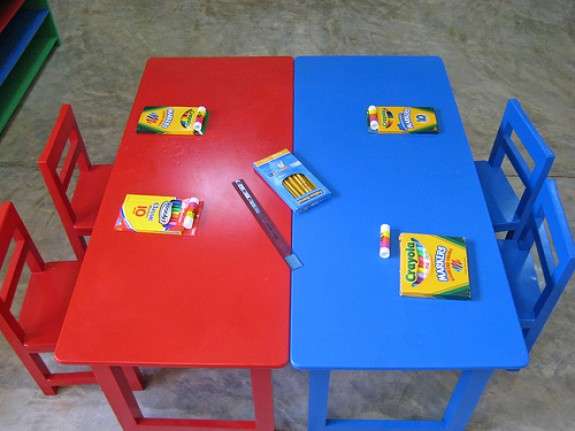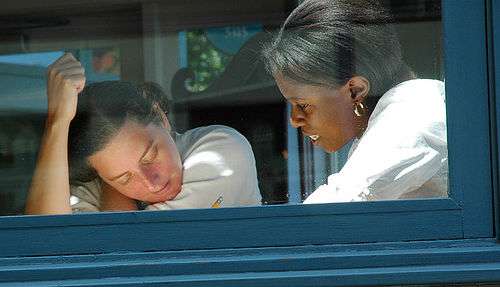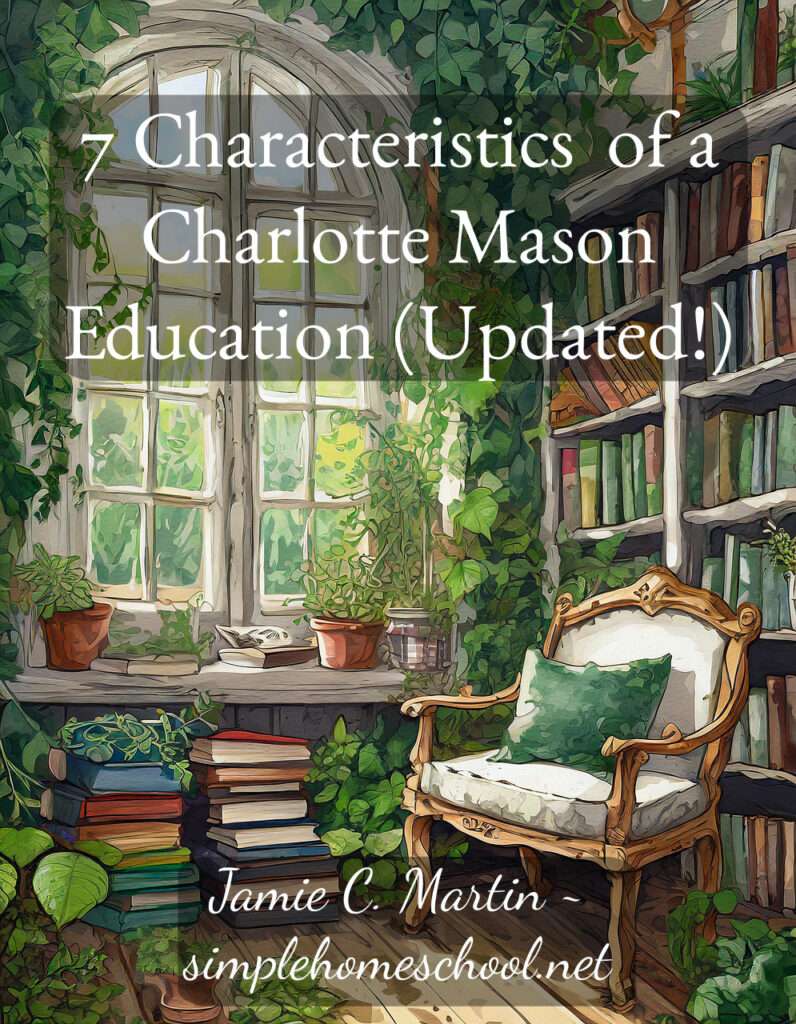
7 Characteristics of a Charlotte Mason Education (UPDATED!) ~
Written by Jamie C. Martin of Simple Homeschool
Welcome back to my newest Simple Homeschool series, in which I’m going back in time to share my thoughts as a retired homeschool mom after 15 years of active duty. 😉
This month I decided to revisit this popular post from the very first year of Simple Homeschool; I wrote it in 2010!
Obviously I have a lot more experience and thoughts of my own to share now, so I’ve updated the post below with them. Look for the red headings to easily spot those.
Let’s learn a bit more about Charlotte Mason education together:
Prefer to listen instead?
*****
If you’ve been homeschooling for long, you’ve undoubtedly heard of Charlotte Mason.
Her educational principles, which she developed in 19th century England, offer much to home educating children and families alike.
But what exactly is a Charlotte Mason education? How can you know if it will work well for your family?
Use this overview to help you decide.
7 Characteristics of a Charlotte Mason Education
1. Habits
Charlotte believed that the development of good habits within a child provides the foundation for early education. She wrote, “The mother who takes pains to endow her children with good habits secures for herself smooth and easy days.”
For this reason Charlotte advised delaying formal academics until age six, instead advocating play and work within the gentle boundaries of the family unit.
Charlotte saw good habits as so crucial that she recommended putting all else aside if a bad habit appeared, and working with the child (in a friendly way) to reconcile the issue before it could develop further.
Jamie’s thoughts on habits today:
Keep in mind that Charlotte Mason worked with children in schools, and was not a mother herself. Please have no guilt if you find that instilling good habits in your children is a lifelong endeavor – it is!
I agree with the delay of formal academics (in most cases), and that is what worked well in our family. However, I can remember feeling guilt over the fact that my kids did have bad habits, and this can feel even heavier to those of us who have children with a variety of diagnoses and special needs.
Habits are a big priority, but they are not our ONLY priority. Success in this area can take a decade or more to observe!
2. Style of Lessons
Charlotte Mason style lessons are short, especially for young children. The goal is to train the child to focus fully on their work, but only for the amount of time they are developmentally capable of.
For early elementary-aged children this often means only 5-15 minutes per subject. In older grades the duration extends to 45 minutes or more.
 Photo by D. Sharon Pruitt
Photo by D. Sharon Pruitt
When a child becomes restless, Charlotte advised changing the lesson to a different type of subject–maybe moving from handwriting to music study, or from math to handicrafts.
Short lessons means that more subjects can be incorporated into a school day. This fits with the Charlotte Mason philosophy of introducing many topics to children and allowing them to delve deeper into the ones that spark their interest.
Jamie’s thoughts on style of lessons today:
Yes! I 100% agree that short lessons are the best lessons, especially for littles, but boy did my Inner Taskmaster find it hard to stop without reaching the “official” end.
I felt like I didn’t get my closure and gold star! Looking back though, I would try to work with a timer/clock and mark where we leave off so we could return and begin the next time.
3. Living Books
Living books are the opposite of textbooks–quality literature (either fiction or non-fiction) written by an author with a passion for the topic. The writer’s passion and expertise breathes life into the book, as opposed to a textbook that gives impersonal overviews of many topics.
Living books present inspiring stories that engage the minds of children and adults alike, providing characters our children can look up to and emulate.
Jamie’s thoughts on living books today:
Yes, especially for younger ages, living books are the way to go! However, for those of us with a proclivity toward insecurity, please remember that this does NOT mean that you must only choose books that are 100 years old or were on Charlotte’s official reading list.
You’re looking for books, new and old, that have that spark of life to them that captures your own imagination and that of your child. You get to create your own list as you go!
4. Narration
A Charlotte Mason-style education uses narration as one of the central methods to evaluate a student. The goal is to teach a child to think and express themselves clearly.
Up until the age of 10 or 11, Charlotte advises teachers to use mainly oral narration with a child. After listening to a short passage of a book, the child will tell back, in his or her own words, important aspects of the story.
Letting a young child do this orally helps them develop analytical thinking skills without getting stuck by the physical mechanics of handwriting.
At around age 11 Charlotte Mason teachers begin having children do written narrations, which lengthen and become more in depth as children get older.
Jamie’s thoughts on narration today:
I experienced a ton of pressure in this area that we weren’t “doing it right.” It’s essential to remember that life with a classroom of students must be organized differently to life at home with a handful.
When I asked my kids to repeat back what they had heard…it often resulted in that deer in headlights look, left me feeling disappointed, and took away from the enjoyment in what we were reading. But there were other times when the kids were so excited about something they had read that they couldn’t wait to come and tell me every. single. detail.
This is narration at home, in the context of real life. The same way that we might summarize a book for our adult friends! So experiment with narration to see how or if it works for you, but feel free to allow it to naturally happen as opposed to forcing it.
5. Dictation
Dictation exercises introduce and reinforce spelling and grammar concepts.
Charlotte recommends using inspiring quotations or Scripture for dictation. The child studies the passage until they are certain of the spelling and punctuation. Then the teacher dictates the passage slowly while the child writes it down.
Formal grammar study is usually delayed until age 10 or 11 in a Charlotte Mason education.
 Photo by Wonderlane
Photo by Wonderlane
Jamie’s thoughts on dictation today:
I definitely agree with the concept of delaying formal grammar study as a general idea. Aside from Mad Libs and chatting casually about grammar mistakes in real life (as an English major and author, grammar is very important to me!), we delayed this formally even longer than Charlotte.
We used Fix It Grammar for a while; I loved those workbooks! Dictation is a bit like copywork, which I listed as one of the things I’d do differently of if I could go back in time.
But dictation was not a top priority for us until the teen years, and it doesn’t have to be for you to homeschool well. Try it and then decide for yourself!
6. Art & Music Study
Charlotte Mason believed in exposing a child to greatness in many forms, which is why she introduced music and art appreciation at her schools.
In Charlotte’s schools, one composer or artist was studied each term–both through experiencing the music and art, reading living books about the artist, and perhaps reproducing the style through art or music lessons.
Jamie’s thoughts on art and music study today:
Of course it is beautiful to introduce art and music to a child, yes! If this an area of personal passion for you as a homeschooling parent, then please focus on it and share your own inspiration. That always makes for beautiful memories and learning moments!
However, if it feels rote, remember that it doesn’t have to be as formal as it was in Charlotte’s schools to make an impact over your entire homeschooling years. You are spreading a feast for your kids, as Charlotte used to say, but you are NOT force-feeding them. There is a difference!
7. Nature Study
 Photo by James Wheare
Photo by James Wheare
Charlotte thought children should spend as much time as possible outdoors, especially as young students.
Students kept their own detailed nature journals as part of their nature study and also used nature guides to discover and identify the natural world in their neighborhood.
Jamie’s thoughts on nature study today:
You do not have to spend several hours outside daily to have your kids appreciate and benefit from nature. Some of CM’s quotes suggest otherwise, and if that fills you with guilt, remember to look at the heart behind it.
Nature inspires us and is and worth getting into whenever possible, but your kids aren’t doomed to failure if they miss a day or don’t spend six hours outside in the rain LOL! We never did nature journals, but I know other families who have and have loved them.
Good and terrifying news: You get to be your own expert, on this and every other decision!
*****
Charlotte Mason’s ideas created an educational revolution when she developed them. She hoped education would open the doors of equality and opportunity to all.
She believed that, regardless of what social class they belonged to, children deserved dignity and respect. <— THIS is my biggest Charlotte Mason takeaway. Use her ideas out of dignity and respect for your individual children; don’t use them out of fear of failing your kids or getting it wrong.
Never put any homeschool philosophy or method above a precious child of God!
Charlotte expressed the hope in many a homeschooling parent’s heart when she wrote the following:
“The question is not,—how much does the youth know? when he has finished his education—but how much does he care?
And about how many orders of things does he care? In fact, how large is the room in which he finds his feet set? And, therefore, how full is the life he has before him?”
Further Links to Learn More (UPDATED):
- Modern Miss Mason
- Heritage Mom
- Ambleside Online
- Living Books Curriculum
- What is the Charlotte Mason Method? (a good overview)
- When Children Love to Learn: A Practical Application of Charlotte Mason’s Philosophy for Today
- A Charlotte Mason Companion: Personal Reflections on the Gentle Art of Learning
- For the Children’s Sake: Foundations of Education for Home and School

Has your family incorporated any of Charlotte Mason’s ideas? Please share what has worked for you.
What’s Your Homeschool Mom Personality? Take Jamie’s quiz now and receive a free personality report to help you organize your homeschool based on what your personality type needs most!

 Weekend homeschool links: May 3rd
Weekend homeschool links: May 3rd
We do #2-7. I guess I’m more Charlotte Mason than I thought. I especially love the short lessons with my 6yo. Because we are one-on-one, she doesn’t need much more than 15-20 min. per lesson, so we get to cover so many things in a week! We use dictation and narration, but I still teach grammar.
I agree about habit-forming! We did not wait until 6 to start school, though.
I wrote a post a while back on Charlotte Mason picture study: http://homegrownmom.com/homeschool-2/art-appreciation-made-simple/937
Love this post, you make it all very easy to understand!
.-= Angela @ Homegrown Mom’s last blog: Blessings To-Do =-.
You make it sound so sensible! My sister-in-law is a hard-core Charlotte Mason home-schooler, and I had gotten the impression that the approach was mostly about shunning anything written after 1900 as “dumbed down.” I love 19th century lit, and I think much of it is still “living,” but a lot of what Charlotte herself would have used is so hopelessly dated as to be damaging. It hardly seems right to subject a 21st-century American 7-year-old to a history of England that a) would put an adult to sleep, and b) should put one’s hair on end with its casual attitude toward violence and its prejudicial, colonialist language and stereotypes. Never mind the complete lack of historical accuracy!
There are many ways to implement Charlotte’s ideas and while some try to replicate her exact curriculum, many others seek to pull out the beautiful aspects of the philosophy while still updating the theories to make sense in our modern world.
Thanks for your thoughts!
.-= Simple Homeschool~Jamie’s last blog: 7 Characteristics of a Charlotte Mason Education =-.
Are you referring to Our Island Story? We enjoy this book, my husband is a historian and he listens to the recordings and says it’s completely accurate, the kids listen attentively and learn much about the story of England, it’s a perfect place to start so you can move on to American history, our government is based off the Roman s methods of government and they brought it to England when they conquered the island before Christ’s time. Our sheriffs come from English shirereeves, who collected taxes and enforced laws for the king. The writ of habeas corpus was written in the English house of commons(our congress emulates this) because the people were sick of kings confiscating their property and putting them in the tower(jail) with out a trial. Our language also originates on this little island, for wonder histories of the English speaking people there is a set of four books by Winston Churchill called A History of the English Speaking People, it is on the book list for highschool CM curriculum. We were excited to see this since we have owned and read these books for 20 years. Another fabulous and new book is To Rule The Waves by Arthur Herman, he covers a navy history of England that involves the entire world, navigation, the first explorers and colonizing the new world. Superb history, our 14 year old read it and so did our friends, they learned huge amounts of knowledge and we own two copies now since we refer to it.
nice, clear overview! thanks so much!
.-= Aimee’s last blog: Beware the "Good Deal" =-.
Great overview, Jamie! I do hope you will consider contributing this to the next CM blog carnival. I’m hosting it, and I’d be so pleased if you’d submit it.
Thank you for those links. Those are a good resource for follow up, I hadn’t heard of all of those.
What a great overview, thanks for sharing all these resources!
.-= Kristen’s last blog: Happy Birthday Sweet Girl (yes, another birthday!) =-.
Thank you for this overview of Charlotte Mason. I get so overwhelmed with all the (let’s face it, long and wordy) CM resources on the web. It was nice to read a simplified list of principles that are not too far off from my personal homeschooling philosophy. Thanks!
Ana
.-= Ana’s last blog: I will never complain about having a bad day again. =-.
I think I should like CM but every time I read up on it I just have an aversion. Many aspects I do appreciate (nature, habits, living books) but the rest just seems so antiquated to me. My homeschooled kids are still only 4yo so maybe I’ll understand this part when they are older, but I just don’t get the short time periods spent on each subject. It seems so compartmentalized and jerky, to go from this subject to that to another. That seems to make ‘learning’ separate from ‘living’ in my view (“now we’re doing spelling, now we’re doing math…”). Maybe I’m just more of a ‘whole project’ type of learner.
If flows well once you are used to it and familiar with the methods, of course not all aspects of any curriculum fit each family, every family I know that home schools does it so differently, none of them use all the curriculum from one source, they always like pieces of things from many different companies/ideas. The narration and the timeline are two ways the “jerkiness” is removed from CM methods. The switch from one topic to the next is done smoothly, organized and prepared ahead of time, it keeps the kids interested and working efficiently. It eliminates the glassy eyed boredom by keeping a quick lively pace going. it’s actually compatible with how our brains work, long term memory is engaged in many sessions of less than 10 minutes to learn or practice something. Short term only holds onto about 7 items at a time in a subject so switching frequently keeps the interest up and prevents the heads from dropping onto the desk. It works, we have seven kids, ages 16 to 1, four boys and three girls and these methods are very stable and build a solid foundation. We have done the textbook, worksheet, drill method and it was not teaching them useable lifelong knowledge. We use our science textbook in a fashion compatible with CM, we read it and we discuss it and we draw our ‘notes’ and we don’t answer the questions at the end of the chapter, we review what we liked and learned from the text and it’s almost never what the questions reflect. Knowledge should be personal, meaningful and permanent and this technique accomplishes those purposes. My nine year old son is doing very well in science, not from a testing point of view but from a loving learning view point, he enjoys it and begs for the lesson to continue! Some days I say nope and with a smile shut the book and others I say sure we can do another page. This happens with history as well. Even math, my seven year old son often asks if he can do one more page. He also requested to do two reading/spelling lessons this week, “just to get more done” he said. I adore teaching my kids! Usually.
We use the Charlotte Mason method of homeschooling in our home. I have read her original writings and I have a great respect for this woman who loved and respected children as people at a time when “children should be seen and not heard” was a common saying. Her method truly respects the child as an individual; for instance, after reading a book, instead of doing a worksheet with right and wrong answers, the child is asked to narrate orally, where there are no right or wrong answers. The child is giving their own impression of the reading. No marks are given in a Charlotte Mason education, because each child will learn different things based on their own interests and personality. She compared it to spreading a banquet before them (of ideas); and the children take in what they like.
I can understand the aversion some people have to Charlotte Mason when what they are going by is the current evangelical Christian “version” of the method, which in my opinion focuses too much on the Victorian time period CM wrote in, and not her actual writings! Charlotte Mason said that teachers should always be updating their booklists as new, good books become available. Also, she was a great believer in Science–and Evolution, for that matter, although you don’t hear that a lot–and she believed that parents and teachers should make an effort to stay up to date with modern science, especially when it comes to child development.
That said, we do read many of the selections at Ambleside Online, because so many of those older books are just wonderful. However, we certainly don’t avoid more modern literature as well. Overall, Charlotte Mason works very well for our family and I’m glad I found this method.
.-= Laura @ Getting There’s last blog: Just enjoying a warm spring day. =-.
I like the ideas of Charlotte Mason and I was wondering about how strickly you can adhere to her methods or if you have to keep records of work your children do to show to the state what you are doing?
We are completing our second year of homeschooling and I have been aware of the Charlotte Mason approach for about two years now. How-to implement the approach has been a bit hazy to me. So, basically, I would plan the subjects and concepts that I need to teach in a given year( I believe this is provided in Charlotte Mason resources)? Next I would decide which books(preferably listed living books also provided in Charlotte Mason resources) and hands-on experiences(to include nature) will help teach the subjects and concepts?
Am I on the right track?
Ambleside online has a yearly planner. All I do is tweek it and print it. Hope this helps. Melani
One way to get started is to pick the books, good ones and more is not necessarily better, CM is a lifelong learning system, it’s like slow and steady wins the race approach. It’s a sure foundation to build upon. This knowledge will be added upon so stay focused on your goals, don’t get too much just because it all sounds so good.
So- the books are chosen and then we look at page count, difficulty and number of books in the subject and how many days a week it will be done. We divide pages by days in the set time frame and write it on a post it note in the front cover of the book, along with grade level. So my 9 year old, in fourth grade is using a 6th grade science book and we need to do a page a day for two years, this allows for 15 minute lessons and discussions. The sophomore book list has short books read in a week or two and they read longer books at a pace of 10 pages a week or whatever the goal is. CM highschool schedule is set up for each subject daily, she has citizenship, government and economics for example and we put one period for these three and they rotate days. So discuss with older students their capabilities and desires and how many hours they can commit to each week/day. Let them set up the schedule with you. This is me speaking, not CM, I like my kids to take ownership and responsibility for their learning and this creates accountability and they feel empowered and it’s a tailored fit.
I wish I had habit training ideas for my 13 year old.
Read Charlottes books, Ourselves and Formation of Character, they are longwinded however I feel the tidbits of genius in them are invaluable. Another great book for training children in good habits for life is by Nicoleen Peck. Parenting a House United, teaches accountability and independence so they are ready to be a great adult. It has strategies for teaching life skills, for instance, she makes a list of skills – clean a toilet, mop kitchen, weed garden, cook a meal- and makes a note card for each and the process is the first time it’s done the mom does it and the child watches, second- the child does it with mom stepping in when needed, third mom watches and only talks no doing, fourth the mom is not there and the child does task alone and then gets mom to come see. If this is done well the task is signed off and the child graduates from this task and moves on the next one.
CM ideas for habits are to read the bible and parents are to watch the child and work on habits and she goes over common bad habits in her books. She also talks about having heroes, I liked this part, it’s not todays version of a hero whose a popular sports figure, it’s how to emulate someone you look up to and how to learn to be like them because they’re your hero you want to mirror their good traits in yourself.